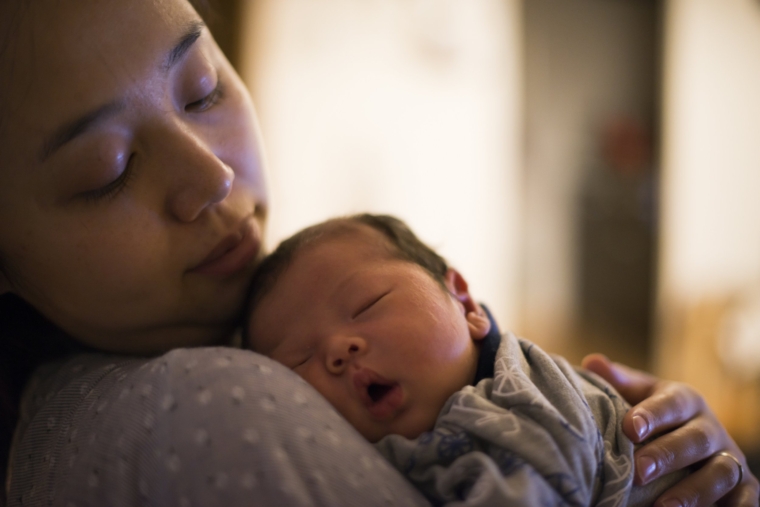The midwife passes the baby to her mother, she stares into his eyes and boom, she’s in love. It’s the fairy-tale first moment of motherhood: an integral, unassailable part of the postnatal experience. But that instant connection doesn’t happen for every new parent.
“When I saw my baby for the first time, I didn’t smile or feel joy; I didn’t feel anything,” says Caroline* (not her real name), whose daughter is now 15 – and she’s far from being alone. About a third of UK mothers have difficulties bonding with their babies, according to the National Childbirth Trust, yet the subject is rarely talked about openly because it’s laden with guilt and shame.
“I felt as if I was a terrible person and that there was something seriously wrong with me,” says Amy*, who didn’t feel a connection with her son, now one, until several weeks after the birth.

It is an issue I explore in Hush, my debut novel. I felt an immediate bond with my children, now seven and five, but during my pregnancies I worried that I might not.
A couple of friends had shared their experiences of feeling numb when they met their babies for the first time. They’d recount their stories in whispers, years after it had happened, and make me promise not to repeat them.
“I’m only comfortable talking now because I have reached a stage where I do love my son and feel very bonded to him,” says Amy, who says she kept quiet at first because of the stigma surrounding the subject.
I’d seldom seen the taboo reflected in contemporary fiction, either. I could only think of one recent example: We Need to Talk Aabout Kevin, in which the baby grows up to be a crossbow-wielding mass murderer – was he born like that, or was his mother’s ambivalence the cause?
More on Parenting
I wanted to write a more relatable story about the struggle to bond, so I created Stevie, a woman in her late thirties who decided to have a child on her own using a sperm donor and IVF. She expects the baby to be the missing piece in her life, but doesn’t experience the oceanic bliss that was advertised, and after a high-flying career, is completely unprepared for the realities of being at home with a newborn.
So why do some women bond immediately, and others don’t? There are a variety of reasons, says psychotherapist and author Julia Bueno. “I talk to a lot of women who might struggle to bond with their baby because of a history of pregnancy loss. For them, a pregnancy can feel quite tentative or parenthetical – it’s terrifying to believe the baby’s going to live so they protect themselves by not bonding.”
Sleep deprivation and exhaustion can inhibit connection, too, Bueno says, as well as a fear of repeating the mistakes their own mothers made with them. “I have lots of men and women coming to me saying ‘I’m terrified of becoming my mother or father’,” she says. “That’s their biggest fear and they don’t want to replicate it.”
“When my son was born, I thought he was beautiful,” says Amy, “but I also thought my life was over, that I’d never sleep again, and that I’d be a terrible mother. I felt a huge responsibility and worried that any wrong step I made would scar him for life.”
Gradually, as the weeks passed, Amy began to have feelings for her son. “As his personality became more pronounced, I felt like I was being shown some love and was needed for something other than milk,” she says.
“I felt moved when he smiled and laughed. At night when I was putting him to bed, I would list all the people who loved him. One day I said that I loved him, and it didn’t feel like I was trying to convince myself anymore.”
Another common factor in delayed bonding is a traumatic birth. “This can cause a delay in the oxytocin [known as a “happy hormone”] being released,” Bueno says. “The bonding might kick in hours or even days later, but sometimes it will take longer.”

Caroline was born with spina bifida and had to have a caesarean under general anaesthetic. “It sounds like a doddle,” she says. “You’re put to sleep; you wake up and there’s a baby. But it didn’t turn out that way.”
She was given pain relief during the operation, which should have been topped up before she came round, but wasn’t. “I woke up in absolute agony in the recovery room on my own – it was as if I’d been stabbed – and I saw my baby asleep in her tray,” she says. “You’re supposed to feel warmth and joy but all I felt was pain.”
Caring for her daughter in the early weeks felt like a chore. She says: “I was going through the motions of what I had to do. In terms of affection, it just wasn’t there.”
It’s only in the past five years, since requesting her birth notes from the hospital, that Caroline has begun to understand the damage that associating her baby with the agony she felt after the birth and not being able to hold her immediately had had on their relationship. EMDR therapy and speaking to an anaesthetist and obstetrician at the hospital about her experience have helped her.
“I wanted to tell them that women are losing something when they don’t get the aftercare they need: the opportunity to bond with their child,” she says.
More from Lifestyle
Many women in this situation – the character in my novel included – worry about the impact delayed bonding might have on her child in the long term. Bueno says they shouldn’t worry. “We know that the first two years of life are very important, but a couple of months of adjusting is not going to cause a lot of harm,” says Bueno.
‘‘Women underestimate how much bonding is going on – their babies are warm, cuddled, soothed and fed and they’re attuned to them – they’re just being super tough on themselves.”
Most of all, adds Bueno, new mothers should try to have confidence in their abilities: “We’re mammals with an innate, inbuilt caregiving system. We know how to mother instinctively and we know how to do it really well.”
Hush by Kate Maxwell (Virago, £16.99) is out now
* Names have been changed

Maurice Saatchi: I used to adore capitalism – then I had lunch with Margaret Thatcher